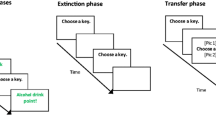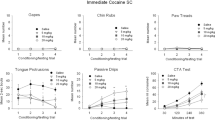Abstract.
Rationale: Drug-related cues may acquire incentive properties through classical conditioning. Objective: The present study investigated whether arbitrary stimuli paired with a low dose of alcohol would evoke differential skin conductance, salivary, craving and attentional orienting responses compared to arbitrary stimuli paired with vehicle in a sample of social drinkers. Methods: A discriminative classical conditioning procedure was employed, in which subjects repeatedly consumed two drinks, which differed in terms of the flavour of the drink and the colour of the glass in which it was administered. One of the drinks (CS+) always contained 0.2 g/kg ethanol in flavoured tonic water and the other drink (CS–) always contained flavoured tonic water only. Alcohol craving, amount of salivation, and skin conductance level were measured in response to CS+ and CS– during conditioning training. After conditioning training, the frequency with which subjects directed their attention to CS+ and CS– drinks and their choice of drinks was assessed. Results: Comparable taste intensity ratings were given for alcohol and placebo drinks. Higher ratings of craving in the presence of CS+ and higher feelings of "lightheaded", "relaxed" and "contented" after consumption of the CS+ drink (compared with CS–) were observed over successive conditioning sessions. Skin conductance level was also higher in response to CS+ compared to CS–. After conditioning sessions were completed, subjects shifted their gaze more frequently towards CS+ than CS–, although they did not choose to consume more CS+ than CS– drinks when instructed to choose between them. Conclusions: These data suggest that conditioned responses to an arbitrary cue paired with alcohol will develop rapidly and provide further support for incentive salience theories of drug addiction.
Similar content being viewed by others
Author information
Authors and Affiliations
Additional information
Electronic Publication
Rights and permissions
About this article
Cite this article
Field, M., Duka, T. Cues paired with a low dose of alcohol acquire conditioned incentive properties in social drinkers. Psychopharmacology 159, 325–334 (2002). https://doi.org/10.1007/s00213-001-0923-z
Received:
Accepted:
Published:
Issue Date:
DOI: https://doi.org/10.1007/s00213-001-0923-z




